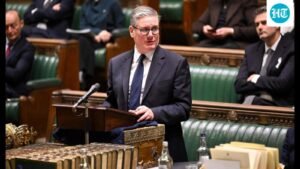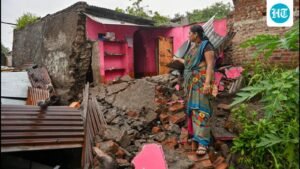
External affairs minister S Jaishankar, while stating that investors look for continuity, a better Centre-state relationship and quality of governance while investing, said that Maharashtra would benefit the most from the India-Middle-East-Europe Economic Corridor (IMEC), as it was going to be India’s interface for the corridor.

The minister, who was in Mumbai on Sunday to campaign for the Mahayuti government, said that Maharashtra had a long history of attracting foreign direct investment because of its investment-friendly approach, and one should look at the new possibilities of investment. “IMEC is the world’s most-talked-about connectivity corridor to the world, as it will pass around the Suez Canal,” he said. “Maharashtra will be the Indian interface of the corridor. The maximum ports, logistics, road and railway development will be in Maharashtra.”
Also read | Maharashtra polls: MVA announces 85 seats to each party
Jaishankar said that the state had a very strong history and important geography because of the sea coast. “Investors are very interested in investing in Maharashtra, but what they do expect is alignment of state and Centre, quality of governance and smooth implementation of policies. Therefore, the double-engine government in Maharashtra is the need of the hour,” he said in a pitch for the Mahayuti government before the assembly elections. He then added that internal security was the prerequisite of investment, progress and development and in its third term, the Modi government had focused upon it.
While replying to a query pertaining to the agreement between India and China to restore each other’s rights of patrolling, the minister said that India expected to restore the 2020 situation for patrolling in Depsang and Demchok in the border areas. “It will take time for the implementation to come through, but change is happening,” he said. “We have been treading in that direction. Disengagement of patrolling has been agreed upon (by China) and we expect that the security forces from our two countries, which had come close to a face-off, will step back. De-escalation from both sides will be the next step.”
Also read | Political shake-up Navi Mumbai: After BJP and Sena, NCP (SP) and MVA leaders challenge party unity
While speaking about the opposition Maha Vikas Aghadi (MVA)’s charges of the state losing its investment to neighboring Gujarat and not getting the support of the Modi government during its tenure, the minister said that the central government believed in “competitive federalism”. “Investors do their own assessment before investing and have their own calculations,” he said. “They expect state governments to be positive, effective and sincere. It all depends on how the state government handles investors. There is no point in blaming the central government.”
Also read | Maharashtra polls: Jarange-Patil’s decision to contest select seats may dent MVA’s numbers
Jaishankar later visited the Gem and Jewelery Export Promotion Council (GJEPC) at BKC on Sunday. He was welcomed by industry leaders such as Vipul Shah, GJPEC vice-president Kirit Bhansali, Bharat Diamond Bourse president Anoop Mehta and vice-president Mehul Shah. They addressed pressing concerns, including the shrinking American market, fluctuating global demand and intensifying competition. Members also highlighted the need for diversification and increased government support to stabilize and grow exports.
Vipul Shah said the diamond industry was grateful for the government’s active support in mitigating the impacts of G7 sanctions on Russian diamonds, which had enabled the industry to continue operating with resilience and adaptability. “In these testing times, we look towards the ministry of external affairs for strategic support to champion Indian gems and jewelery in every corner of the globe,” he said. “With your support, we can strengthen India’s global footprint, enhance our market access, and uplift the industry at this crucial juncture.”
Jaishankar emphasized the importance of industry-government collaboration, encouraging businesses to directly engage with international counterparts. He reaffirmed the government’s commitment to driving export-oriented growth and said that it was seized of the fact of falling exports from the country. “We are discussing a strategic policy of shifting the narrative in favor of India in these very difficult times for the world economy,” he said.







